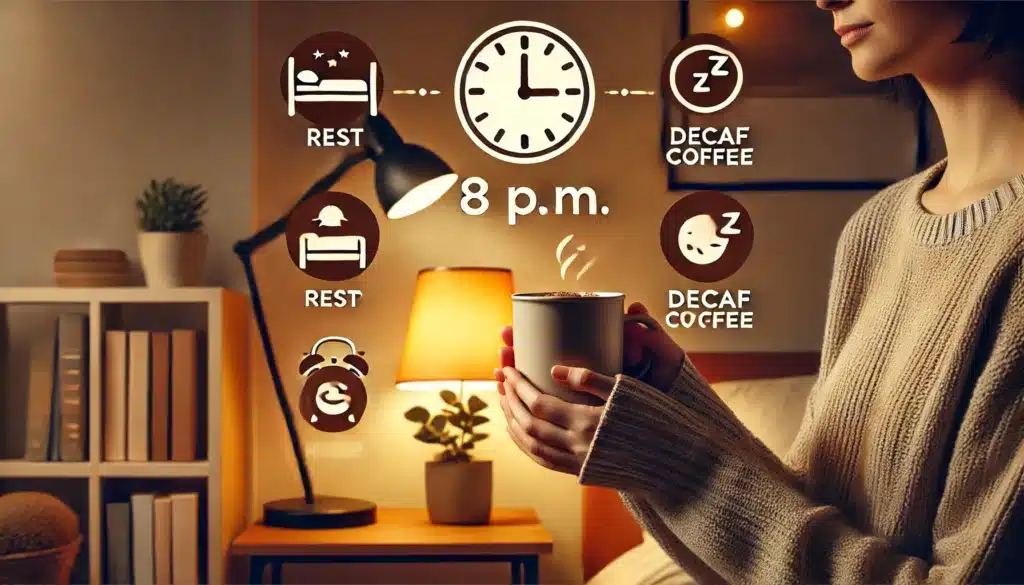Coffee is beloved for its energizing power — but that same boost can interfere with one of the most essential pillars of health: sleep. While some people seem unaffected by an evening espresso, others struggle to fall asleep after an afternoon cup.
In this article, we’ll explore how coffee affects sleep quality, why timing and sensitivity matter, and how to enjoy your brew without sacrificing rest.
1. How Caffeine Works
Caffeine blocks adenosine receptors in the brain — the chemical responsible for making you feel sleepy.
This leads to:
- Increased alertness
- Reduced fatigue
- Delayed sleep signals
It’s great for productivity — but disruptive if consumed too close to bedtime.
2. Caffeine’s Half-Life and Timing
Caffeine has a half-life of 5 to 6 hours in most adults.
That means if you drink a cup at 4 p.m., half of that caffeine may still be active at 10 p.m.
For better sleep:
- Avoid caffeine at least 6 hours before bedtime
- Consider earlier cut-off times if you’re sensitive
3. Effects on Sleep Quality
Studies show that caffeine can:
- Reduce total sleep time
- Lower deep sleep (slow-wave sleep)
- Increase nighttime awakenings
Even if you fall asleep easily, your sleep may be lighter and less restorative.
4. Individual Sensitivity Matters
Caffeine sensitivity varies widely and depends on:
- Genetics
- Age
- Hormonal cycles
- Habitual intake
Some people metabolize caffeine slowly, making it more disruptive to their sleep cycle — even at low doses.
5. Afternoon Coffee and Sleep Disruption
Many people can tolerate morning coffee without sleep issues. However:
- Drinking coffee after 2 p.m. is more likely to interfere with sleep
- Energy “crashes” in the afternoon may tempt people to drink more — creating a cycle
Instead, try movement, hydration, or a short nap to re-energize.
6. Coffee vs. Other Caffeine Sources
Remember that caffeine isn’t just in coffee:
- Tea
- Chocolate
- Soft drinks
- Energy drinks
- Pre-workout supplements
These also impact your sleep — often more than you realize.
7. Decaf as a Late-Day Option
Decaf coffee contains 2 to 5 mg of caffeine per cup — much less than regular coffee.
It can be a good choice for:
- Evening rituals
- After-dinner comfort
- Those who enjoy the taste without the buzz
Just be sure it’s truly decaf and not low-caf blends.
8. Coffee and Insomnia
For those prone to insomnia or sleep disorders, caffeine can:
- Prolong time to fall asleep
- Increase restlessness
- Decrease total sleep hours
If sleep is a recurring issue, consider eliminating caffeine for 2–4 weeks to evaluate its impact.
9. Better Coffee Habits for Better Sleep
To enjoy coffee and protect your rest:
- Limit intake to 1–3 cups per day
- Stick to morning or early afternoon consumption
- Stay hydrated and avoid sugary coffee drinks
- Switch to herbal teas or warm water in the evening
Mindful timing is key.
10. Coffee and Circadian Rhythms
Caffeine can shift your internal clock, especially if consumed late.
This impacts:
- Melatonin release
- Sleep-wake cycles
- Morning alertness
To stay in sync, align coffee with natural light exposure and regular sleep patterns.
Final Thoughts: Sip Smart for Restful Nights
Coffee and sleep don’t have to be enemies — but they do require balance. With smart timing and awareness of your body’s signals, you can enjoy the best of both worlds: energized mornings and restorative nights.
So sip wisely, know your limits, and protect your rest one cup at a time.







